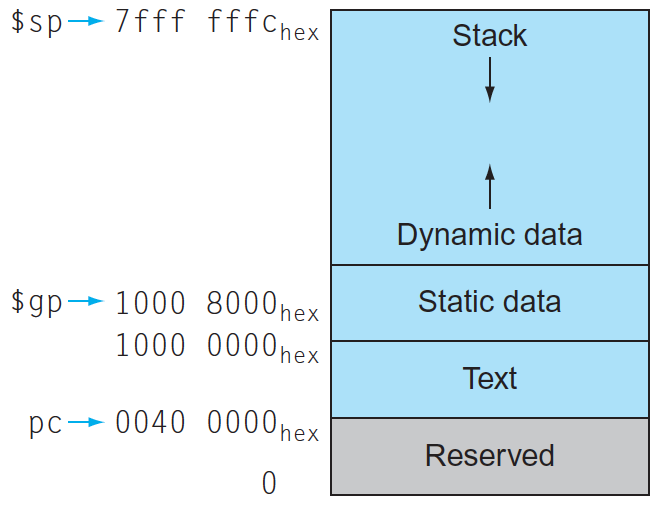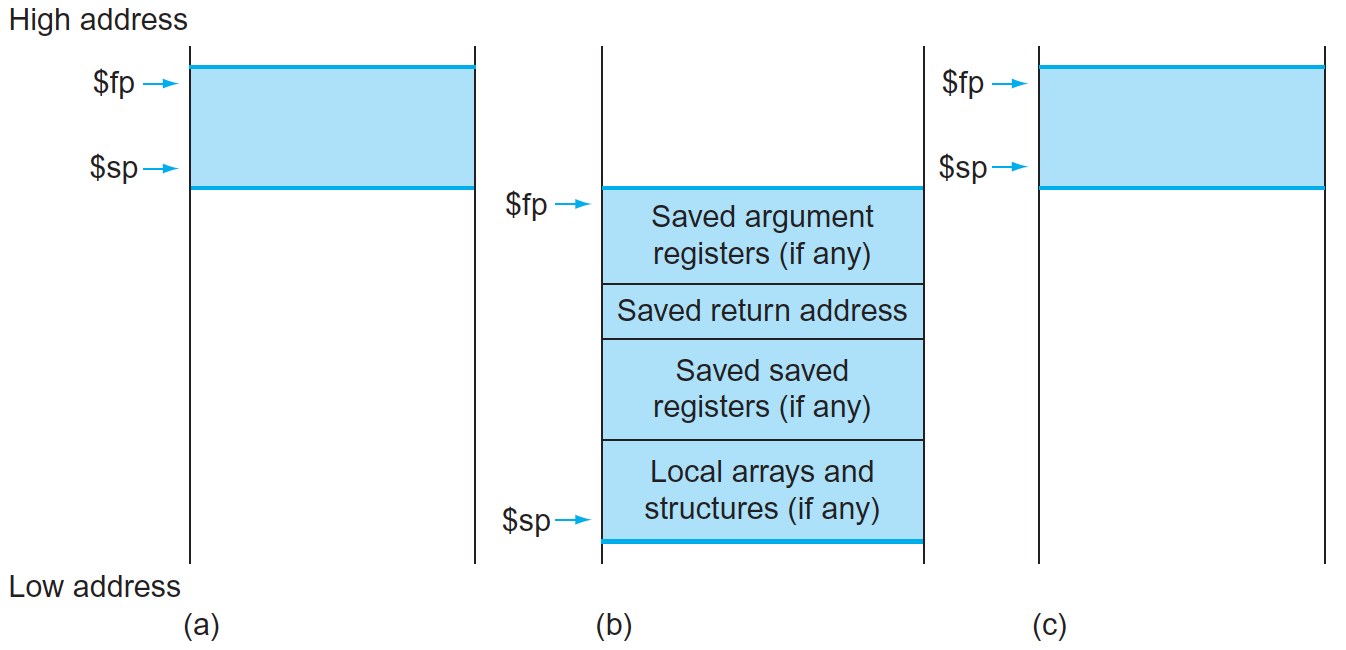# Procedures --- CS 130 // 2021-10-11 <!--=====================================================================--> ## Administrivia - Quiz 2 debrief - <!-- .element: class="fragment"--> Quiz 3 on Wednesday + Translating some simple C to MIPS like we've been doing this last week <!--=====================================================================--> # Questions ## ...about anything? <!--=====================================================================--> # Conditionals <!-- .slide: data-background="#004477" --> <!--=====================================================================--> ## Conditionals - `beq` `$s0`, `$s1`, `label` + <!-- .element: class="fragment"--> "Branch when equal" + <!-- .element: class="fragment"--> If `$s0` is equal to `$s1`, then jump to `label` - <!-- .element: class="fragment"--> `bne` `$s0`, `$s1`, `label` + <!-- .element: class="fragment"--> "Branch when not equal" + <!-- .element: class="fragment"--> If `$s0` does not equal `$s1`, then jump to `label` - <!-- .element: class="fragment"--> `slt` `$t0`, `$s0`, `$s1` (`slti` variant) + <!-- .element: class="fragment"--> "Set on less than" + <!-- .element: class="fragment"--> `$t0` = 1 if `$s0` < `$s1` else 0 <!--====================================================================--> ## Compiling an `if` Statement ```c if (i == j) // $s0 <- i, $s1 <- j k = 1; // $s2 <- k m = 0; // $s3 <- m ``` --- ```mips bne $s0, $s1, Exit li $s2, 1 Exit: li $s3, 0 ``` <!----------------------------------> ```c if (i == j) // $s0 <- i, $s1 <- j k = 1; // $s2 <- k else k = 2; m = 0; // $s3 <- m ``` --- ```mips bne $s0, $s1, Else li $s2, 1 j Exit Else: li $s2, 2 Exit: li $s3, 0 ``` <!----------------------------------> ```c if (i == j) // $s0 <- i, $s1 <- j k = 1; // $s2 <- k else if (i != g) k = 2; else k = 3; m = 0; // $s3 <- m ``` --- ```mips bne $s0, $s1, ElseIf li $s2, 1 j Exit ElseIf: beq $s0, $s3, Else li $s2, 2 j Exit Else: li $s2, 3 Exit: li $s3, 0 ``` <!-- .element: class="fragment"--> <!--====================================================================--> ## Compiling a `while` Statement ```c while (i != 10) // $s0 <- i { i++; } j = 0; // $s1 <- j ``` --- ```mips li $t0, 10 Loop: beq $s0, $t0, Done addi $s0, $s0, 1 j Loop Done: li $s1, 0 ``` <!-- .element: class="fragment"--> <!--=====================================================================--> # Procedures <!-- .slide: data-background="#004477" --> <!--====================================================================--> ### Compile a Simple Leaf Procedure ```c int func(int x, int y) { return x + y; } ``` --- ```mips func: add $v0, $a0, $a1 jr $ra ``` <!-- .element: class="fragment"--> <!--====================================================================--> ### Calling Our Leaf Procedure ```c int func(int x, int y) { return x + y; } int main() { func(1, 2); } ``` --- ```mips func: add $v0, $a0, $a1 jr $ra main: li $a0, 1 li $a1, 2 jal func ``` <!-- .element: class="fragment"--> <!----------------------------------> ### Nested Procedure Calls ```c int main() { func(1, func(2, func(3, 4))); } ``` --- ```mips main: li $a0, 3 li $a1, 4 jal func li $a0, 2 move $a1, $v0 jal func li $a0, 1 move $a1, $v0 jal func ``` <!-- .element: class="fragment"--> <!--====================================================================--> ## Calling a Procedure 1. Put parameters in appropriate registers + <!-- .element: class="fragment"--> `$a0`, `$a1`, `$a2`, `$a3` 2. <!-- .element: class="fragment"--> Transfer control to the procedure + <!-- .element: class="fragment"--> `jal ProcedureLabel` 3. <!-- .element: class="fragment"--> Perform task 4. <!-- .element: class="fragment"--> Place result in a location the callee can find + <!-- .element: class="fragment"--> `$v0`, `$v1` 5. <!-- .element: class="fragment"--> Return control to the caller + <!-- .element: class="fragment"--> `jr $ra` <!--====================================================================--> ## Non-Leaf Procedures - Life would be easy if all procedures were "leaves" - In reality, a procedure might call another procedure which may call another procedure ... - <!-- .element: class="fragment"--> We need a way to preserve the state of each partially completed call so that they all return properly <!----------------------------------> ## Non-Leaf Procedures - The most extreme case of this is **recursion** where the number of calls could be arbitrarily large <pre><code class="c" data-trim> int termial(int n) { if (n == 0) return 0; else return n + termial(n - 1); } </code></pre> - <!-- .element: class="fragment"--> Before a procedure calls another procedure, it needs to **save** any data that might be overwritten by the procedure call **in memory** <!--====================================================================--> # Stack <!-- .slide: data-background="#004477" --> <!--====================================================================--> ## Stack - MIPS provides a register `$sp` that stores a memory address - <!-- .element: class="fragment"--> Addresses **above** `$sp` is memory that is already being used by other parts of the program - <!-- .element: class="fragment"--> Addresses **below** `$sp` is free memory <!----------------------------------> ## Stack - The **called** procedure is responsible for restoring any saved registers `$s0`, ..., `$s7` as well as the stack pointer `$sp` register before returning - <!-- .element: class="fragment"--> Any other register may be used without restoration, so the **calling** procedure is responsible for saving any data before making the call <!--====================================================================--> ## Memory Structure  <!--====================================================================--> ## Stack Frames  <!--====================================================================--> ## Termial Example ```c int termial(int n) { if (n == 0) return 0; else return n + termial(n - 1); } ``` <!----------------------------------> ## Termial Example ```mips termial: beq $a0, $zero, ret_zero # Checks base case addi $sp, $sp, -8 # Allocates space sw $ra, 0($sp) # for $ra and n sw $a0, 4($sp) # on the stack addi $a0, $a0, -1 # Loads n-1 as arg jal termial # Calls termial(n-1) lw $a0, 4($sp) # Restores n add $v0, $v0, $a0 # Adds n to result lw $ra, 0($sp) # Restores $ra addi $sp, $sp, 8 # Deallocates memory jr $ra # Returns result ret_zero: li $v0, 0 # Returns 0 jr $ra ``` <!--====================================================================--> ## Exercise - Convert the following C code into MIPS ```c int compute (int e) { return e + e; } int calc(int c) { int d = compute(7); return c + d; } int main() { int a = 5; int b = calc(a); } ``` <!----------------------------------> ## Exercise: Compute ```c int compute (int e) { return e + e; } ``` ```mips compute: add $v0, $a0, $a0 # returns e + e jr $ra ``` <!-- .element: class="fragment"--> <!----------------------------------> ## Exercise: Calc - Take 1 ```c int calc(int c) { int d = compute(7); return c + d; } ``` ```mips calc: li $a0, 7 # puts 7 in a0 jal compute # calls compute(7) add $v0, $v0, $a0 # adds argument to result jr $ra ``` <!-- .element: class="fragment"--> - <!-- .element: class="fragment"--> Unfortunately this will fail. Why? + <!-- .element: class="fragment"--> Both `$a0` and `$ra` will be erased! <!----------------------------------> ## Exercise: Calc - Take 1 ```c int calc(int c) { int d = compute(7); return c + d; } ``` ```mips calc: addi $sp, $sp, -8 # allocates space sw $a0, 0($sp) # stores c on the stack sw $ra, 4($sp) # stores $ra on the stack li $a0, 7 # puts 7 in a0 jal compute # calls compute(7) lw $ra, 4($sp) # restores $ra lw $a0, 0($sp) # restores argument addi $sp, $sp, 8 # deallocates space add $v0, $v0, $a0 # adds argument to result jr $ra ``` <!-- .element: class="fragment"--> <!----------------------------------> ## Exercise: Main ```c int main() { int a = 5; int b = calc(a); } ``` ```mips main: li $s0, 5 # a = 5 move $a0, $s0 # loads a into argument jal calc # calls calc(5) move $s1, $v0 # b = result ``` <!-- .element: class="fragment"--> <!--====================================================================--> # Tail Recursion <!-- .slide: data-background="#004477" --> <!--====================================================================--> ## Tail Calls - A **tail call** is when a procedure immediately returns the result of another procedure ```c int foo(int x) { return x + x; } int bar(int x) { int y = x + x; return foo(y); } ``` - <!-- .element: class="fragment"--> A tail call can be implemented **without** creating a new procedure frame <!----------------------------------> ## Tail Calls ```c int foo(int x) { return x + x; } int bar(int x) { int y = x + x; return foo(y); } ``` ```mips foo: add $v0, $a0, $a0 jr $ra bar: add $a0, $a0, $a0 j foo ``` <!--====================================================================--> ## Tail Recursion - If a function makes tail calls to itself, it is called **tail recursive** - <!-- .element: class="fragment"--> Is our implementation of `termial` tail recursive? ```c int termial(int n) { if (n == 0) return 0; else return n + termial(n - 1); } ``` - <!-- .element: class="fragment"--> No! It has to add `n` before returning <!----------------------------------> ## Tail Recursion - Can we implement it tail recursively? ```c int terminal(int n) { return termial_helper(n, 0); } int termial_helper(int n, int so_far) { if (n == 0) return 0; else return termial_helper(n - 1, n + so_far); } ``` <!----------------------------------> ## Tail Recursion - What does this look like in MIPS? ```mips termial: li $a1, 0 termial_helper: beq $a0, $zero, ret_so_far add $a1, $a1, $a0 j termial_helper ret_so_far: move $v0, $a1 jr $ra ```